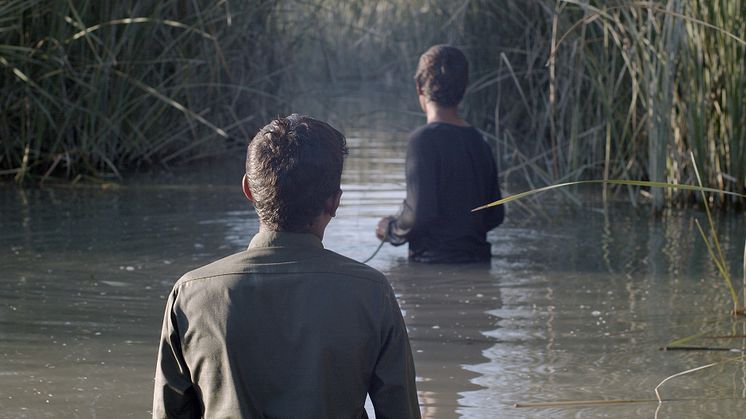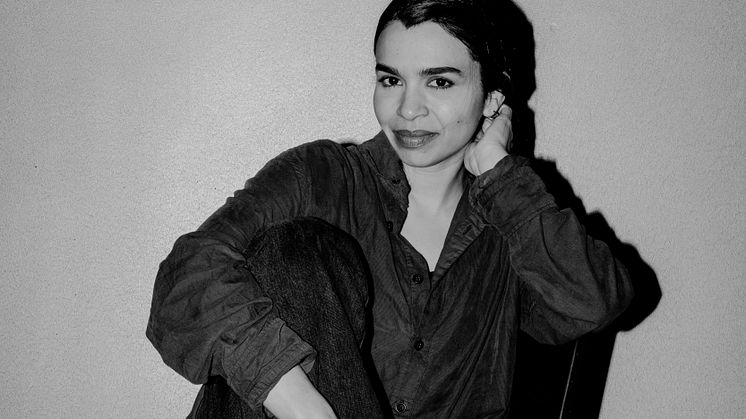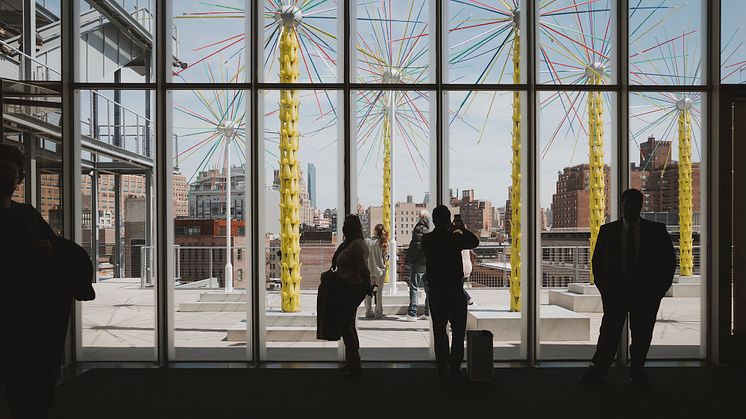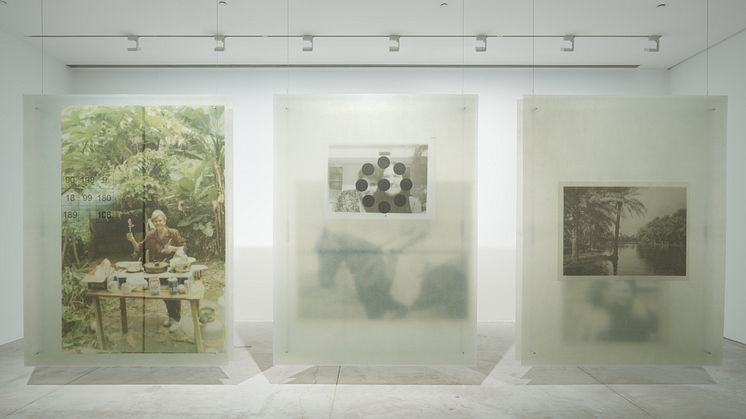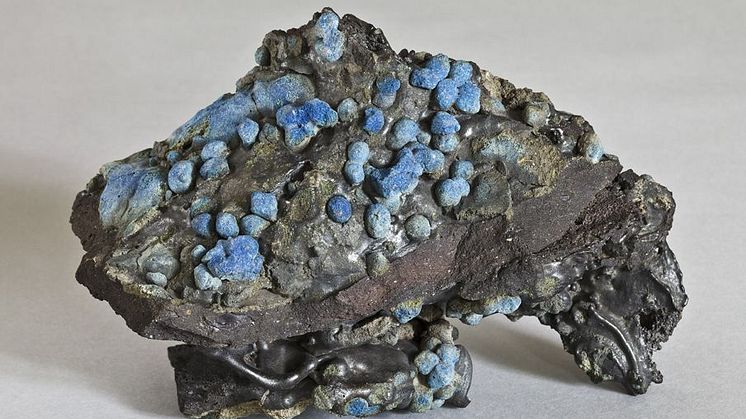
Press release -
Alia Farid presents solo exhibition at Copenhagen Contemporary and the Glyptotek
On October 2 2025, the Glyptotek and Copenhagen Contemporary will open A Sounding of the Earth, the first exhibition in Denmark by Kuwaiti-Puerto Rican artist Alia Farid (b. 1985). The exhibition is the largest solo presentation of her work in Scandinavia, exploring the terrain of the Arab Gulf region – a landscape shaped both by one of the world’s oldest civilizations and by modern forms of warfare, violence and extraction.
A Sounding of the Earth marks the third and final chapter of Hosting Histories – Revisiting Cultural Heritage of the Middle East and Beyond, a joint exhibition series by the Glyptotek and Copenhagen Contemporary that invites contemporary artists to revisit ancient cultural heritage and its significanse today. The exhibition brings together new iterations of Farid’s long-term projects as well as new, site-specific works created for this occasion.
In the exhibition, Farid explores how social structures and materials evolve under the rapidly changing ecological circumstances of the Arab Gulf. She combines handmade and industrial objects with ostensibly differing meanings to reflect the context her practice develops in – a region where modernity is laden by the same imperial forces that fragment and extract from it.
Alia Farid lives and works in Kuwait and Puerto Rico. Her practice explores the ways material cultural heritage is interwoven with narratives of migration and extraction. Taking overlooked and omitted histories as a point of departure, Farid creates counter-narratives that defy the oversimplification and one-sidedness that often characterizes Western and colonial representations of the Arab Gulf and the Caribbean. In the artist’s latest works she traces how materials and forms change as they move from place to place, reflecting on their evolving meanings and their relation to society.
The Oil Industry and Archaeology
Through large-scale sculptures and film, Farid reimagines the Arab Gulf’s material culture to explore its dual connection to ecological change and social identity. Simultaneously shaped by the modern oil industry and by archeology, the Arab Gulf is home to many separate but interwoven histories. Farid’s exhibition points to the ways cultural heritage is subject to transmutation according to circumstance, exploring its revivals through rituals, practices and material expressions. An example presented in the exhibition is an artificial palm orchard that alludes to a formerly existing date palm forest in southern Iraq, a forest razed during the US invasion of Iraq in 2003. Farid’s sculptures can thus be read as hosting multiple histories, spurring alternative understandings of heritage.
“Contemporary art makes us look at the world anew. With Hosting Histories – Revisiting Cultural Heritage of the Middle East and Beyond we introduce a new generation of artists with a critical eye on the cultural heritage of the Middle East. Here Alia Farid is a central figure, combining in-depth research with powerful artistic expression. Her works speak to the senses in a way news or academic analysis cannot. The encounter between the Glyptotek’s collections from the ancient world and Farid’s contemporary perspective generates a tension in which cultural heritage is challenged and reinterpreted,” says Marie Laurberg, director of Copenhagen Contemporary.
Reimagining Cultural Heritage
The exhibition is the third and last in the series Hosting Histories – Revisiting Cultural Heritage of the Middle East and Beyond presented by the Glyptotek and Copenhagen Contemporary. The series began in 2023 with the exhibition curtain call by Canadian-Iranian artist Abbas Akhavan focusing on the migration of cultural heritage and the way artefacts, like people, can be forcibly displaced as victims of war, geopolitical conflict and colonialism. In 2024 Palestinian artist duo Basel Abbas and Ruanne Abou-Rahme presented The song is the call and the land is calling, highlighting the ways cultural heritage can serve as a basis for resistance and the right to an identity and self-determination.
Hosting Histories – Revisiting Cultural Heritage of the Middle East and Beyond concludes in 2025 with the first major solo exhibition in Denmark by Kuwaiti-Puerto Rican artist Alia Farid, whose work explores how landscapes are harnessed and reimagined by their communities, states and corporations.
“At a time of global conflicts, climate crisis and cultural polarisation it is more important than ever to take an active and critical stance in relationship to our cultural heritage. We need to be open to new perspectives that can enhance our understanding of the past and the meaning it holds today. The interaction between the Glyptotek’s ancient collections and Copenhagen Contemporary’s focus on contemporary art has created a unique space for professional cross-fertilisation – and for works of art that possess historical depth as well as contemporary perspectives,” says Gertrud Hvidberg-Hansen, director of the Glyptotek.
FACTS
The Artist
Alia Farid holds a BA in Visual Art from La Escuela de Artes Plásticas de Puerto Rico, an MSc in Visual Studies from MIT and an MA in Museum Studies and Critical Theory from MACBA in Barcelona. In 2023 she received the Lise Wilhelmsen Art Award and from 2023-2024 was the David and Roberta Logie Fellow at Harvard Radcliffe Institute. She has held solo exhibitions at Henie Onstad Kunstsenter (Oslo), Chisenhale Gallery (London), Kunsthalle Basel; Contemporary Art Museum St. Louis (Missouri), Kunstinstituut Melly (Rotterdam), Portikus (Frankfurt am Main) and CAC Passerelle. Upcoming exhibitions include shows at Contemporary Art Museum Houston and Detroit Institute of Arts.
The Exhibition and Works
Title: Alia Farid: A Sounding of the Earth
Place: Copenhagen Contemporary and the Glyptotek
Exhibition dates:
The Glyptotek: 02.10.2025 – 31.5.2026
Copenhagen Contemporary: 02.10.2025 – 06.04.2026
Curators: Anna Kærsgaard Gregersen (the Glyptotek) and Aukje Lepoutre Ravn (Copenhagen Contemporary)
At Copenhagen Contemporary Alia Farid exhibits two works that connect the landscapes of the Arab Gulf region with political and spiritual narratives:
Chibayish (2022/2023): Two-channel video installation filmed in the Iraqi wetlands, or in Arabic, Al-Ahwar. The film oscillates between documentary and dreamlike footage of life in the wetlands as the aftermath of warfare forms a backdrop to daily life.
Amulets (2025): Two amulet forms that represent local traditions of protective shapes, rendered in a material derived from oil refinement. The sculptures juxtapose the region’s spiritual heritage with the present forms of extraction that shape it.
At the Glyptotek Farid exhibits three brand-new works located on the central axis of the museum. Together they form a constellation of protective objects and places within the architecture of the museum. Amidst the Glyptotek’s own collections of migrated objects, Farid’s works invite us to question the forces that control the passage of artefacts and species across time and borders.
Kupol LR 3303 Talisman 04, 05, 06 (2025): Six panels of blue-green resin from the oil industry combined with photographs from the artist’s own family albums and symbolic patterns akin to age-old systems of divination like geomancy and magic squares. Inspired by faience amulets, the work represents a gesture of protection and connection across matrilineal familial ties in the Arab Gulf region.
Knotted Net NME MA4240 (2025): Used cargo nets from the shipping industry hang like draped curtains in the Winter Garden of the Glyptotek. The structure of the nets mirrors the nets the Egyptians used to protect the bodies of their departed as they crossed into the afterlife. The artist thus reflects on the migration and transmutation of objects and their meanings as they traverse different contexts.
Palm Orchard (2025): Three palm trees, cast and made from mass-produced parts, reflects how industrial material culture alludes to the once date palm forest of Abu Al Khaseed in Iraq.
The Collaboration between the Glyptotek and Copenhagen Contemporary
Hosting Histories – Revisiting Cultural Heritage of the Middle East and Beyond is a three-year collaboration between the Glyptotek and Copenhagen Contemporary (CC) in which international contemporary artists revisit the cultural heritage of the ancient world and its significance today. From 2023 to 2025 the two institutions have worked together on a joint exhibition trilogy in which contemporary artists have been invited to cast new light on the Glyptotek’s collections from the Middle East. Through newly commissioned works and exhibitions the trilogy explores the ways in which cultural heritage changes meaning across time, place and political context.
Thank You
The three-year exhibition programme Hosting Histories – Revisiting Cultural Heritage of the Middle East and Beyond has been generously supported by:
The Obel Foundation
The exhibition at The Glyptotek is further supported by:
Aage og Johanne Louis-Hansens Fond
Ny Carlsbergfondet
Sportgoodsfonden
Sponsorship: Trip & Co
The exhibition at Copenhagen Contemporary is further supported by:
The A.P. Moller Foundation
Sponsorship: Flügger
Contact:
For press photos or interviews with the artist or curators please contact:
Copenhagen Contemporary:
Nicolai Oreskov Westh
E: nicolai@cphco.org
T: + 45 5250 4201
The Glyptotek:
Camilla Kjærsgaard
E: cakj@glyptoteket.dk
T: + 45 5128 1288
Related links
Topics
Categories
Copenhagen Contemporary (CC) er Københavns internationale kunstcenter, der viser installationskunst skabt af samtidskunstens verdensstjerner og nye talenter. CC har til huse i den prægtige gamle B&W-svejsehal istandsat af arkitekt Dorte Mandrup, der med sine i alt 7.000 m2 smukke industrihaller har pladsen til at udstille de teknisk og pladskrævende formater, som mange samtidskunstnere arbejder i: Store totalinstallationer, performancekunst og monumentale videoværker. Det er kunst, man ofte kan gå ind i og sanse med hele kroppen.


